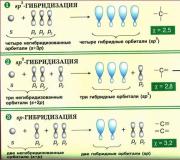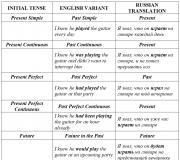The rule for the accusative case of nouns in German. Cases in German
German verbs, like Russian ones, consist of a stem and an ending -en or -n.
Let's look at verb conjugation using a simple example:
learn en
The verb lernen (translation: teach, study) consists of a stem (red) and an ending (blue)
The endings of verbs, in turn, change depending on the person, number and tense in which the verb is used.
In German, as in Russian, there is
singular: I, you, he, she, it, you (polite form), woman, cat, boy
and plural: we, you, they, you (polite form), people, cities, books
There are also times. There are only six of them in German, but only five are used.
We'll start with the verb conjugation lernen in present time Präsens
Conjugation of weak verbs in Präsens
In German they also say: I teach, you teach, she teaches, we teach, and so on.
You will notice that the forms for er, sie, es and ihr are the same and have the ending -t, also the verb form for wir, sie, Sie is similar to initial form verb, that is, the Infinitiv of the verb and has an ending -en.
Features of verb conjugation in the present tense
If the stem of the verb (weak or strong, not changing the root vowel) ends in -d, t or a combination of consonants chn, ffn, dm, gn, tm (e.g. antworten, bilden, zeichnen), then between the stem of the verb and the personal ending is inserted vowel e.
If the stem of the verb (weak or strong) ends in -s, -ss, -ß, -z, -tz (e.g. grüßen, heißen, lesen, sitzen), then in the 2nd person singular the s at the end is dropped, and the verbs get the ending -t.
Please note that the form of the verb when used politely (the pronoun you) in German coincides with the 3rd person plural.
You see that strong verbs also have conjugation features in the present tense.
The conjugations of such verbs can be carefully studied on a table specially developed by the team Start Deutsch

In addition to weak verbs, German has strong verbs:
a) Strong verbs in the 2nd and 3rd person singular modify the root vowel:
a, au, o receive an umlaut (e.g. fahren, laufen, halten)
vowel e becomes i or ie (geben, lesen)
b) For strong verbs with an inflected root vowel, the stem of which ends in -t, in the 2nd and 3rd person singular the connecting vowel e is not added, and in the 3rd person the ending is also not added (for example, halten - du hältst, er hält), and in the second person plural (where the root vowel does not change) they, like weak verbs, receive a connecting -e- (ihr haltet).
Also in the German language there are verbs whose conjugation must be learned by heart. These include:
Auxiliary verbs
sein (to be)
haben (to have)
werden (to become)
according to their morphological features, they belong to irregular verbs, which, when conjugated in the present, exhibit a deviation from the general rule.
Watch and learn the conjugation of auxiliary verbs in the present tense Präsens. When learning German, you need to know these verbs , because they are used not only in the present tense, but also with their help to form the past tense, the future tense and the passive, which is important in the German language.

AND modal verbs You also need to learn it by heart!
Please note that modal verbs in the 1st and 3rd person singular do not receive an ending -e and some of them lose the umlaut in the conjugation.

If this topic is not yet clear to you, then you can watch the video on conjugation German verbs in present time.
Now let's move on to conjugating verbs in the simple past tense Präteritum.
To construct a sentence in the simple past tense Präteritum you need to know the formation of three forms of the verb and choose the 2nd form Präteritum
1 form - Infinitive(initial verb form)
2 form - Präteritum(used to form the simple past tense Präteritum)
3 form - Patrizip 2(it is used to form the complex past tense Perfect)
Let's take the same verb lernen. As you already know, the verb lernen is weak verb. In order for you to better understand this you, we will also conjugate strong verb fahren. First, we need to select the form of the verb we need (highlighted in gray). Then look at the table and substitute the necessary endings.
lernen - lernte - gelern
fahren - fuhr - gefahren
That is, in the place in the table where there is a dash, the form Präteritum is used (lernte, fuhr, etc.)
You just need to remember the endings in this form and also correctly identify the 2nd form of the verb. That's all! Pretty simple, right?

They conjugate using the same principle auxiliary verbs in Präteritum:

Attention! Modal verbs are used in the past tense only in the Präteritum tense, even if you speak in Perfect!
Therefore, you need to memorize modal verbs in the form Präteritum!

Everything is not as complicated as it seems at first glance :)
Good luck in learning German!
Svetlana Kizhikova,
If you want to learn French there are many different ways. You can go to a French speaking country and work there, you can take French classes or you use the bab.la French verb conjugation tool! The bab.la French verb conjugation is a super easy way to get to know the French verb conjugation and to practice your French verb conjugation skills. To practice your French verb conjugation skills is very important when you really want to know French by heart. The French grammar is really tricky sometimes - especially the French verb conjugation! It is important to repeat the French verb conjugation almost every day to get great results. One way to practice French verb conjugation is, as said, the use of the French verb conjugation tool. With the French verb conjugation tool you can search for French verb conjugation by letter, meaning that you can you start with learning all the French verb conjugation beginning with the letter A, then B and so on. If you are looking for a welcome change you can also use the bab.la French verb conjugation games and quizzes. In the sector bab.la Quizzes you will find a lot of quizzes and you can focus on the grammar category to practice French verb conjugation. When you want something more playful you can go to the bab.la Games. There you will find games like Hangman or Memorize. These games allow you to practice French verb conjugation in a really funny way. Start practicing French verb conjugation now!
In this article we will not present countless tables; there is no doubt that they are useful, but for most students they are tedious and create the impression that German grammar is tough only for “smart people.”
Therefore, here we will tell you point by point and in simple language, everything you need to know about conjugating German verbs to get started.
The conjugation of verbs in German is accompanied by changes in:
- Persons (I, you, you, we, he, she, they).
- Numbers (singular, plural).
- Times (present, past, future).
Verbs change in the same way in Russian, so such diversity should not surprise us. It is enough to get acquainted with exactly what forms the conjugation of German verbs gives.
In order to conjugate, you need to determine the initial form of the German verb:
If in Russian it ends in “-т” (deeds t, cook t, running t), then in German it is “-en”.
mach en- -do,
koch en- prepare,
heß en- call,
lauf en- run.
In order to form another form of the verb, you need to drop the -en and add a new ending to the stem.
First person - me and us
It’s very simple: if you are talking about yourself alone, add the laconic ending “-e” to the base, if you are not alone, then the ending “-en”.
I do - Ich mach e,
We do - Wir mach en.
As we see, in plural The first person form of the verb, in fact, does not change. It is the same as the initial one.
Second person - you and you
It is the second person that we use when addressing someone. Here everything is the other way around, for some reason it deserves a simpler ending. And if you are addressing one interlocutor, then decorate the base of the word with a flowery “-st”. Compare:
You do - Du mach st,
You do - Ihr mach t.
Third person - he, she, they
For the third person, two endings are used: “-t” (singular), “-en” (plural).
He does - Er mach t,
She does - Sie mach t,
They do - Sie mach en.
As you can see, here the plural form of the verb also does not differ from the initial one.
Remembering all these endings is also difficult because they repeat each other. In fact, to form 7 verb forms, only four endings are used: “-e”, “-en”, “-st”, “-t”.
At this point, many people have a logical question: does the base of the word (mach-, koch-, heiß-, lauf-) really not change in any way when conjugating German verbs? After all, it often involves changing the basis (it is not and yeah, I'm not G y)?
German verb conjugation: subtleties

Indeed, in the German language there are special cases of change. Pay attention to verbs that end in a consonant that duplicates the ending. How, for example, to conjugate a word biet en (to offer), because add to the base biet ending "-t" is hardly possible? How to write “you suggest” correctly?
In these cases, the ending is diluted with the letter “-e”.
Ihr biet t- no, they don’t write that way.
Ihr biet et- this is the right option.
This rule also applies to other words that with standard endings will sound dissonant, for example, begegn en (to meet). Its stem ends in -n. Agree, pronouncing -nt is not so easy. And in in this example, the compound -n is preceded by another consonant, so it becomes "-gn". Thus, without dilution, the sentence "You meet" would look like this:
Ihr bege gnt
Three consonants in a row is too difficult to pronounce, and besides, the word is common and clearly deserves to be simply pronounced. Therefore it will be correct:
Ihr begegn et
Irregular Verbs
Verb conjugation in Russian often occurs with alternation at the root. For example, By lag at-po lodge it. German also has Irregular Verbs, the conjugation of which involves changing the vowel in the root, in addition to adding an ending.
These verbs are really easier to understand in tables - keep them handy. The fact is that irregular verbs are the most commonly used. Therefore, although it is necessary to know them by heart, you should not spend too much time cramming them. Read more, analyze, translate original texts, checking the tables of irregular verbs. They will be repeated often enough so that you can learn them without difficulty, while at the same time becoming familiar with the structure, vocabulary and other aspects of the German language.

The most important irregular verbs are sein- be, haben- have, werden- become. Their conjugation must be learned by heart, which also does not cause any particular difficulties, because these verbs are used both independently and as auxiliaries (in various complex forms verbs), and are found very often in any tasks in the German language.
After you have thoroughly studied the conjugation of verbs in the present tense and learned how to use them various shapes, the peculiarities of conjugating German verbs in the past and future tenses will not seem complicated.




